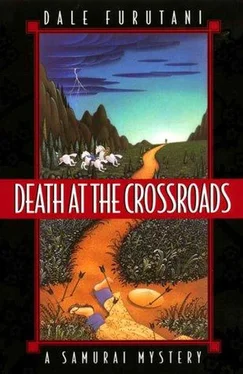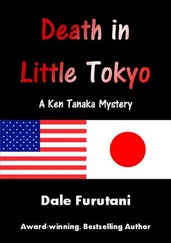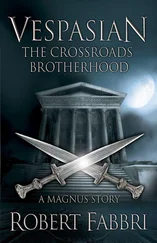Dale Furutani - Death at the Crossroads
Здесь есть возможность читать онлайн «Dale Furutani - Death at the Crossroads» весь текст электронной книги совершенно бесплатно (целиком полную версию без сокращений). В некоторых случаях можно слушать аудио, скачать через торрент в формате fb2 и присутствует краткое содержание. Год выпуска: 2011, ISBN: 2011, Жанр: Исторический детектив, на английском языке. Описание произведения, (предисловие) а так же отзывы посетителей доступны на портале библиотеки ЛибКат.
- Название:Death at the Crossroads
- Автор:
- Жанр:
- Год:2011
- ISBN:068815817X
- Рейтинг книги:3 / 5. Голосов: 1
-
Избранное:Добавить в избранное
- Отзывы:
-
Ваша оценка:
- 60
- 1
- 2
- 3
- 4
- 5
Death at the Crossroads: краткое содержание, описание и аннотация
Предлагаем к чтению аннотацию, описание, краткое содержание или предисловие (зависит от того, что написал сам автор книги «Death at the Crossroads»). Если вы не нашли необходимую информацию о книге — напишите в комментариях, мы постараемся отыскать её.
Death at the Crossroads — читать онлайн бесплатно полную книгу (весь текст) целиком
Ниже представлен текст книги, разбитый по страницам. Система сохранения места последней прочитанной страницы, позволяет с удобством читать онлайн бесплатно книгу «Death at the Crossroads», без необходимости каждый раз заново искать на чём Вы остановились. Поставьте закладку, и сможете в любой момент перейти на страницу, на которой закончили чтение.
Интервал:
Закладка:
So for over thirty years he had remained alone. And although he was never as articulate as when he was under the tutelage of Yuko, he kept the charcoal-selling business in addition to his modest farm. The extra income, usually in the form of rice instead of money, was useful because it allowed him to buy things which would otherwise require the help of a wife and family to make. If it weren’t for the fact that he remained the only charcoal seller in the village, Jiro knew his business would surely suffer because of his lack of conversational skills, but no one else seemed inclined to take on the hard and sometimes dangerous task.
On this morning he was fretting because to every customer he had to make a speech and they would shower him with abuse and anger. He was raising prices.
The day before he had gone into the mountains to buy charcoal from one of the solitary charcoal burners. For once, Jiro wished he had the gift of conversation when he was told that the price of charcoal was being doubled because of the danger from Boss Kuemon’s bandits.
Instead of coherent protest, all Jiro could do was scowl and stare at the charcoal maker in mute rebuke. Finally, he was able to splutter, “That’s too much. I’ll buy from someone else.”
“There is no one else,” the charcoal burner said blandly. “Kintaro was killed last week, and I’m the only one burning charcoal in these parts.”
Jiro took this news with surprise. “Killed?”
“The bandits wanted salt and miso , and I guess Kintaro put up a fuss. He said he was running low on salt the last time I saw him, and I guess he thought if he gave the bandits all he had, he wouldn’t be able to make the offerings of salt and sake to the Stove God when he made the charcoal. Baka! Fool! When they come and tell me to give them things, I just give them. You can always get more salt or miso or sake. There is only one life.” The burner held out his hands in the universal gesture of helplessness. “It’s stupid to fight them.”
“This place is going to the dogs.”
“Yes, and we know why,” the burner said, leaving a long pause as an invitation to Jiro to amplify.
Jiro ignored it. He wouldn’t make idle small talk unless required to by a customer, and he also knew better than to criticize the administration of the District by the new Lord. After thinking of alternate courses of action and finding none, he thrust out a container of homemade sake and said, “Here.”
The burner was not surprised by the lack of transition between business talk and a gift. In the complicated ballet of Japanese commerce, one usually accompanied the other, although Jiro was not the most skilled practitioner of the art of moving from one to the other.
“Thanks!” the burner said with a grin. “I know you probably didn’t bring enough money for the new, higher price. I’ll give you credit for it, and you can pay me the next time you come out for charcoal. Come! Warm yourself by the fire. You must be cold after your walk out from the village.”
Jiro accepted the hospitality and spent the night drinking with the burner. The sake was rich and sweet, with plenty of grains of fermented rice still floating around in the liquid. The burner, after weeks alone in the mountains cutting down trees to make charcoal, was garrulous. Jiro responded with grunts and short phrases, but the burner didn’t mind. The Japanese believe communication involves the whole being, not just words, and Jiro’s grunts and gestures, after a few drinks, seemed as eloquent as the spoken remarks of any companion the burner could want.
Because of the drink, Jiro woke up later than planned. It was still before the dawn, but he was tardy returning to the village. The sky was still black, and familiar stars made their stately procession across the heavens. Peeking over the top of Mount Fukuto, Jiro could see the stars of the Two Lovers very close to each other. They had already come together for their annual kiss that marked the fall, yet the weather was still teetering on the last edge of summer.
In haste, Jiro gathered up his basket of charcoal and paid what money he had brought with him to the burner. Now, as he ran along the path back to the crossroads and the village, he racked his brain to figure out the best way to explain the higher prices to his customers in the village. As usual, his lack of skill in using words failed him, and he couldn’t come up with a satisfactory speech that would soften the blow. As the sun rose in the sky, burning off some of the mist loitering at the bottom of the mountain valley and revealing the low-lying hagi , or bush clover, Jiro still wrestled with the problem.
Jiro was so involved in composing what he was going to say about the higher prices that when he got to the crossroads he almost didn’t see the body exposed by the thinning silver mist until he ran into it.
The body was lying on its side in the center of the crossroads. The crossroads marked the meeting of four paths. One went east to the village of Suzaka, where Jiro lived. One led north out of the area and into the prefecture of Uzen and the rivers beyond. Another led south to the village of Higashi and the prefecture of Rikuzen, and the last path, the one that Jiro was on, went west, deeper into the mountains toward Mount Fukuto.
The body was that of a man, perhaps in his early thirties. He was dressed in a brown kimono with gray hakama , or pants. It was the dress of a man intent on traveling. The legs were splayed and one of the man’s sandals was missing. The remaining sandal, precariously clinging to the other foot, was the coarse-rope sandal of a traveler or pilgrim.
His hair was bound up in the style favored by merchants. The expression on his face was one of pain, and his eyes were squeezed shut, as if he could avoid the darkness of death by eclipsing it with a darkness of his own making.
In his back was an arrow. A bloodstain spread from the point where the arrow penetrated, running parallel to the ground and up toward the man’s head. The arrow was well made, with a straight shaft of clear, dark wood, and gray feathers, finely trimmed.
Jiro had seen death many times before. Some of the deaths were violent. It was hard not to see violent death when you lived in a land where over three hundred years of lethal clan warfare had left its legacy. Yet coming across the body so suddenly and unexpectedly unnerved him.
He skidded to an abrupt halt, the heavy basket of charcoal pushing against his back and shoulders. He dipped backward with a familiar move that simultaneously placed the charcoal basket on the ground and released the shoulder and head lines. He advanced toward the body tentatively, double-checking to make sure the man was not breathing. Jiro squatted next to the body, poked him, and said, “ Oi! You!” No movement. He touched the face of the man. The man’s cheek was cold and lifeless.
Jiro was annoyed. On a morning when mundane problems like being late or explaining a price increase loomed so large, the discovery of this body caused a new level of anxiety. With the increasing breakdown of safety in the District, it wouldn’t surprise him to find bodies in the middle of the village next.
He had to decide what he would do about his discovery. He could avoid the most trouble if he just ignored the body and continued into the village, but the next people through the crossroads would report it, and Jiro might somehow be implicated in the murder.
Of course, when he did report it, he would have to deal with Magistrate Nagato, and that would involve more disruption and unpleasantness. It might even involve a beating if the bullying Magistrate took it into his head to administer one, just on general principle. Jiro sighed. What an annoyance!
Suddenly, behind him, Jiro heard a sound on the path leading to Uzen. He looked around and saw a man rounding a bend in the path, walking toward him. Like the dead man, he was also dressed in the kimono and hakama of a man traveling. Unlike the dead man, this new stranger was clearly a samurai. Over one shoulder, he negligently had a katana in its scabbard, one hand holding the hilt. The black lacquer of the plain scabbard caught the intense morning sun, and Jiro was mesmerized by the glint of the weapon’s sheath.
Читать дальшеИнтервал:
Закладка:
Похожие книги на «Death at the Crossroads»
Представляем Вашему вниманию похожие книги на «Death at the Crossroads» списком для выбора. Мы отобрали схожую по названию и смыслу литературу в надежде предоставить читателям больше вариантов отыскать новые, интересные, ещё непрочитанные произведения.
Обсуждение, отзывы о книге «Death at the Crossroads» и просто собственные мнения читателей. Оставьте ваши комментарии, напишите, что Вы думаете о произведении, его смысле или главных героях. Укажите что конкретно понравилось, а что нет, и почему Вы так считаете.












